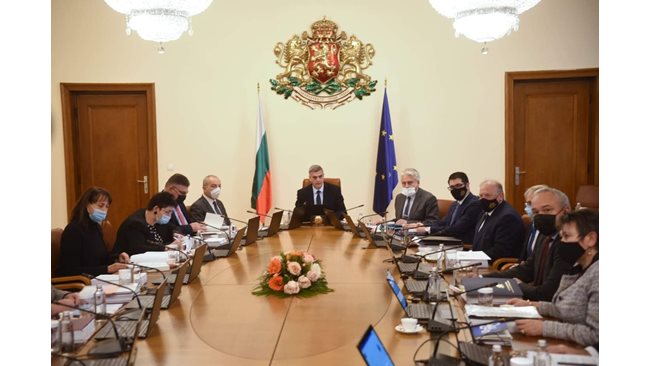The Ministry of Energy has proposed to fall to 10% in four months
Bulgaria is a little late with the proposal, a number of EU countries have already made such decisions
On the stock exchanges in Europe the quotations went crazy, in our country as well is expensive, but no new records
Bulgaria will start preparing a request for the application of a reduced VAT rate for the supply of electricity and natural gas.
This was decided by the government at its meeting on Wednesday. It has approved a report by the Minister of Finance on the start of negotiations with the European Commission’s VAT Committee.
According to the rules, EU countries can lower the tax on certain goods and services, including gas, electricity and central heating. You are entitled to two reduced rates of between 5% and the standard, which in Bulgaria is 20%, one VAT exemption and one other, which varies between 0% and reduced rates.
The caretaker government’s proposal is a measure against high electricity and gas prices, finance ministry sources said. According to them, Bulgaria can negotiate a reduction of the indirect tax to levels of 9%, as is the case for tourism. From several independent sources “24 hours” learned that
of energy
ministry
have suggested
the tax to be
reduced to 10%
for a period of 4 months, which means from January to April next year.
Vasil Velev – rotating chairman of the association of employers’ organizations, said that if the tax reduction is temporary, the business accepts it. But with the proviso that this measure will not solve the issue of high prices in the long run. Given that the electricity costs BGN 400 per megawatt-hour, with the reduced rate the price will fall by BGN 40, and before the increase in quotations the prices on the stock exchange were BGN 100, Velev gave an example. According to him, in this distorted market, now exaggerated money was collected in the budget, in the Security of the Electricity System Fund and in the producers. Therefore, at least 100 branch organizations are currently signing with a request for compensation, as they are not planned for December and January at that time. The amount demanded by the business is over BGN 200 per megawatt-hour.
At the same time, the shock with electricity prices in European markets continues, with another peak with delivery day on December 9.
West of Romania and Serbia, electricity costs between 270 and 287 euros per megawatt-hour, with the most expensive in France – 287.5 euros, in Germany – 277.88 euros. In Bulgaria it is relatively “cheap”, with 233.29 euros per megawatt-hour. For the first time, Poland is raising prices – 227.73 euros, while traditionally there the quotations are less than 200 euros.
To tackle the price dance, EC President Uccyl von den Layen said in October that
Member States
they can
пpeмaxнat
taxes vpxy
current and gas
She told the European Parliament at the time that some measures could be taken very quickly under current EU rules. This includes business benefits through state aid, targeted support for consumers and reduction of energy taxes.
Von der Layen reminded that on average one third of wholesale energy prices are determined by the market, one third depends on infrastructure charges, and another third on national and local taxes, reaching 50% in some Member States.
The EC also pointed out that the countries may introduce measures to directly support end users who have fallen into energy poverty, for example by providing vouchers or paying parts of the energy bill.
Bulgaria is slightly behind with its ideas for tax relief. As early as October, it was agreed in Germany that the tax paid on the support of renewable energy sources by all consumers would be reduced by almost half from 1 January.
Spain, which is more dependent on natural gas for electricity production, decided in July to reduce VAT on electricity.
Subsequent price records removed the effect of the cut, and in September the government temporarily cut another tax on electricity and set limits on energy companies’ profits.
The Czech government has abolished VAT on electricity and gas for the months of November and December and is seeking to extend it for the whole of 2022, if it obtains permission from Brussels. At the end of November, Poland decided to temporarily reduce the taxes on electricity and natural gas for three months from January, as well as the excise tax on fuel for five months.
freeze prices
of gas to the end
at 2022
and the next increase in electricity prices will be limited to 4% due to tax cuts.
Italy is also freezing gas prices for 2.5 million people, while there will be no increase in electricity bills for the poorest. For others, this reduces the VAT rate to 5.5%.
If the proposal to reduce VAT in Bulgaria
get to
vote in
Parliament,
it is not clear whether
will be accepted
Because during the negotiations for a regular cabinet, the future Deputy Prime Minister and Minister of Finance Asen Vassilev rejected a proposal to reduce the tax.
According to him, aid to businesses and households should be targeted, and the introduction of differentiated tax rates could lead to chaos in its collection.
However, the BSP supports the idea of a lower tax and it was from them that this idea came during the discussions on energy in the new quadruple coalition. The BSP’s proposal was to reduce the VAT on electricity and gas to 9%.
In addition, the party wants a special fund to collect excess profits from energy producers and traders. The money would be used to support the economy and business and socially disadvantaged families.
They also want the state to commit to providing free 200 kilowatt hours of electricity to poor families.
During the debates on energy, ITN and Democratic Bulgaria did not comment on the ideas for reducing VAT, but unanimously supported business aid, in which the state bears part of the price of electricity, to continue next year.
They were adopted by the caretaker government in October and November. The reason for not being valid for the coming months was that from this month there will be a working parliament and it can vote on additional measures to support not only businesses but also households.
– .


